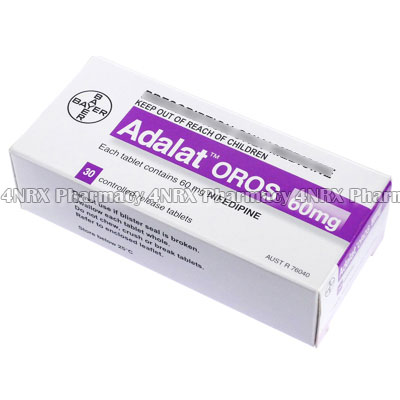 |
Home  Heart Heart  Adalat (Nifedipine) Adalat (Nifedipine) |
|
|||||||||
|
|
Adalat (Nifedipine)
What is Adalat (Nifedipine) used for? Adalat (Nifedipine) is an oral calcium channel blocker used to treat patients suffering from high blood pressure or angina. The medicine works by widening the blood vessels to increase circulation and reduce the amount of work required by the heart. Your physician may also prescribe this medication to treat other unlisted conditions. How should I use Adalat (Nifedipine)? Use Adalat (Nifedipine) according to the directions provided by your physician to get the most effective results from treatment. One tablet is normally taken three times each day, but your individual instructions will depend on your health condition and the severity of your symptoms. The tablets should be swallowed whole and unaltered along with a large glass of water and may be taken on an empty stomach, but a meal is recommended before use if you experience nausea. Never change the form of the medicine prior to use to avoid destroying or changing the effects of its contents. Ask your physician any questions you have about the medicine to ensure the correct usage. What are the side effects of Adalat (Nifedipine)? Side effects that may occur while using Adalat (Nifedipine) include:
Serious side effects that may require immediate medical attention are faintness, deterioration of angina symptoms, trouble breathing, irregular heartbeat, tingling sensation, or jaundice. Inform your physician as soon as you experience any worrying or intense side effects to make sure the correct changes are made to your regimen to prevent further complications from occurring. Please Note Adalat (Nifedipine) should not be used if the patient is a child, if you are allergic to calcium channel blockers, if you have had a recent heart attack, have unstable angina, cardiogenic shock, or aortic stenosis. It is also suggested to inform your physician if you are elderly or have diabetes, porphyrias, heart failure, left ventricular dysfunction, hypotension, decreased kidney function, or if you are undergoing kidney dialysis. These conditions may require special adjustments to your regimen to prevent unexpected health problems from occurring. Strictly follow all instructions provided to you by your physician or pharmacist while using Adalt (Nifedipine). Optimum and safe dosage can differ based on the patient and the condition being treated. As this medication may be unsafe for certain patients, it is essential you always inform your physician if you are pregnant or breastfeeding, as well as if you have any allergies, other illnesses, or ongoing health conditions, and if you are taking any other form of medication, supplements, or herbal products. Immediately seek emergency medical care if you have an allergic or hypersensitive reaction. Common signs of a reaction include hives, swelling, skin rashes, chest pains, as well as trouble breathing or swallowing. 
|
||||||||||||||||||||||